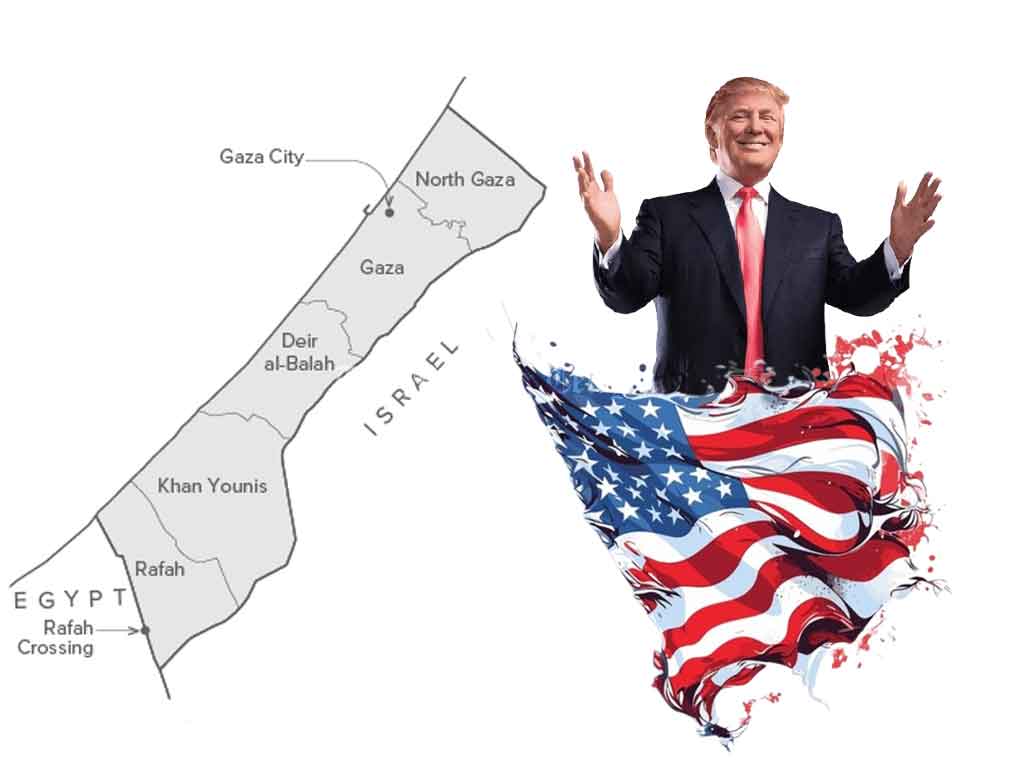
United States President Donald Trump has announced that the U.S. will “take over” and “own” Gaza as part of a redevelopment plan, suggesting that the enclave could be transformed into “the Riviera of the Middle East.” The proposal, which includes resettling Palestinians elsewhere, marks a dramatic shift in U.S. policy toward the Israeli-Palestinian conflict.
Speaking at the White House after a meeting with Israeli Prime Minister Benjamin Netanyahu, Trump stated that his administration would lead the reconstruction of Gaza to provide unlimited jobs and housing. He added that the U.S. would take responsibility for clearing destroyed buildings and dismantling unexploded bombs and other weapons.
The Palestinian group Hamas condemned the plan, calling it a recipe for creating chaos and tension in the region. In a statement, the group asserted that the people of Gaza would not allow such a plan to succeed and emphasized that what is needed is an end to occupation and aggression, not displacement. Hamas claimed that the people of Gaza have already resisted displacement efforts despite ongoing bombardment.
Trump’s proposal has raised uncertainty over ongoing negotiations to extend a fragile ceasefire between Israel and Hamas. The initial 42-day truce, which includes the release of 33 Israeli captives in exchange for nearly 2,000 Palestinian prisoners, is set to expire on March 1. Negotiations are underway for a second phase that could involve a full withdrawal of Israeli troops from Gaza and the release of all remaining captives. However, Trump expressed skepticism about the durability of the agreement, suggesting that hostilities could resume soon.
The U.S. president stated that the decision to take control of Gaza was not made lightly, adding that everyone he had spoken to was enthusiastic about the idea. He envisioned Gaza as an international hub where people from around the world, including Palestinians, could live. However, he also suggested that displaced Palestinians should seek resettlement in other countries that are willing to accept them.
When asked about the possibility of deploying U.S. troops to maintain security in Gaza, Trump said it was an option, stating that the U.S. would do whatever is necessary.
Netanyahu praised Trump as the greatest friend Israel has ever had and said the proposal was worth serious consideration. He expressed optimism about the vision for Gaza, suggesting it could change history.
Trump’s announcement was met with widespread condemnation from Palestinian advocates, political analysts, and human rights organizations. Omar Baddar, a political analyst, described the proposal as an official endorsement of the destruction of Palestinian society and the forced displacement of its people. Abed Ayoub, executive director of the American-Arab Anti-Discrimination Committee, called the plan terrifying and said it would violate international law.
Democratic lawmakers also criticized the proposal, with Representative Rashida Tlaib accusing Trump of openly calling for ethnic cleansing. Senator Chris Murphy dismissed the idea as a distraction from domestic controversies, asserting that the U.S. would not take over Gaza.
Trump has previously suggested that neighboring Arab states such as Egypt and Jordan should accept displaced Palestinians, a proposal that was widely rejected. Arab nations, including Saudi Arabia, the United Arab Emirates, and Qatar, have warned that such plans could destabilize the region and undermine the prospects for peace. Saudi Arabia reaffirmed its stance against any forced displacement of Palestinians and reiterated its commitment to the establishment of an independent Palestinian state.
Some analysts have speculated that Trump’s remarks may be a strategic move to pressure Arab nations into accepting resettlement plans or to bolster his position in future negotiations. Others argue that the proposal contradicts Trump’s “America First” policy, as it would involve a large-scale U.S. involvement in the Middle East.
With tensions in Gaza still high and the ceasefire fragile, Trump’s comments have added further complexity to an already volatile situation. The feasibility and implications of his plan remain uncertain, but the global backlash suggests that any attempt to unilaterally assert U.S. control over Gaza would face strong diplomatic and legal opposition.




